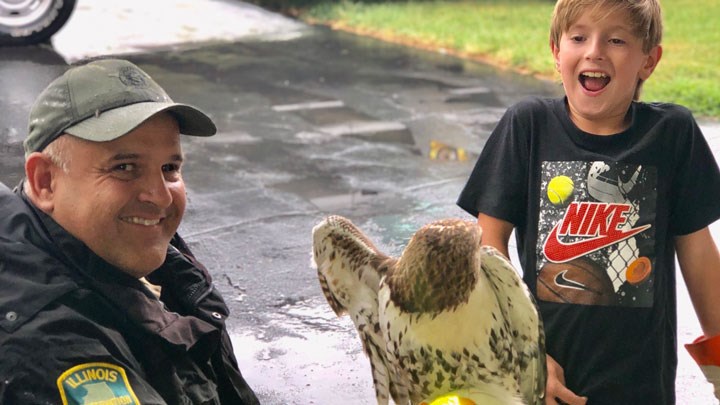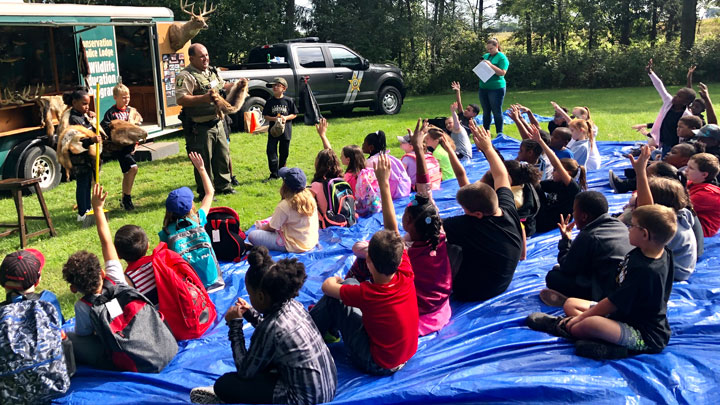
by Steve Beltran, Conservation Police Officer, Illinois Department of Natural Resources - Wednesday, September 9, 2020

The “R3” investment to “recruit, retain and reactivate” new hunters that you made today may create tomorrow's game warden. With so many challenges in recruitment for the outdoors, it has become obvious that these challenges are starting to bleed into the protection of the outdoors. The lack of a foundation for outdoor participants is starting to show up in the recruitment efforts of today's wildlife conservation police officers. Law enforcement hiring is down 63 percent nationwide for all federal, state, county, local and specialized police recruitment. The conservation field is hungry for new officers, but with the overall decline in traditional outdoor sports coupled with today’s diminished desire to pursue a law enforcement career, many state wildlife agencies are struggling to find officers who dream of being game wardens.
For most state agencies, there was never a shortage of people who wanted to get paid to protect our natural resources. Applicants were numbered in the thousands for a handful of position openings. Recruits were willing to travel to other states, take lesser-paying jobs and join the military, all in efforts to gain an advantage in pursuing a career as a game warden. Many students would apply early and often, many times waiting several years to get the opportunity to simply test for the position. However, the number of applicants has dwindled across America due to increasing public scrutiny of the police, limited interest in the outdoors and the struggle faced by the R3 movement to recruit, retain and reactivate those who love the outdoors.
Nationwide the educational requirements for game wardens have been reduced. As the selection pool diminishes, so does the ability to hire well-qualified candidates. The competition for sworn law enforcement has been difficult for many departments. Many agencies financially incentivize applicants with bonuses to entice officers to come over to a higher-paying job. Having the ability to retain an officer is challenging as well. Some agencies simply do not pay well, leaving voids in the already stressed system.
As a result, many officers are beginning their careers in conservation law enforcement without having a passion for the outdoors. Some officers fail to have the basic interests of the natural resources they are sworn to protect and/or lack personal experience in hunting while others have never even shot a gun or touched a fish. Some agencies must choose between a qualified candidate in the outdoor field who lacks exposure and a not so well-qualified candidate who has outdoor experience. Most agencies decide to hire the more qualified candidate and leave the not so qualified applicant behind despite his or her extensive outdoor experience. America’s R3 movement is critical to growing our future protectors.

While not every warden goes to the academy knowing everything about every outdoor experience, most have the basics. For example, most wardens can correlate a duck hunting experience to a deer hunting experience. Some of the hunting techniques may be different, but most of the hunting experience, law foundation and thrill of being outdoors remain the same. Even some of the more obscure enforcement efforts, such as those governing ginseng or timber harvesting, covert investigations and commercial fishing, have a shortened learning curve assuming officers have spent enough time among our renewable natural resources learning the outdoor basics. This is why R3 is so important. The recruitment of our future hunters and game wardens and future resource protection depends heavily on the recruitment, retention and reactivation models being employed by the hunting community and regularly promoted on this NRA Hunters’ Leadership Forum website.
Modern conservation police academies are struggling with the quality and quantity of recruits. Some recruits have a passion for the outdoors and others simply have a need for employment. If the passion does not grow with the officer, the likelihood that he or she ultimately will search for other employment is great. R3 is critical and must be used as a component in developing interest in and programs that promote becoming a game warden.
If you find yourself or someone you know interested in a career in conservation law enforcement, start now by building relationships in and with those in the industry. Obtain the minimum educational requirements and focus on an outdoor related field. You don't have to have a major in police work. Most of that will be provided in the academy. While completing your studies, also consider contacting your local game warden and asking about doing an internship.
Many jurisdictions give veterans preference when hiring for state or federal jobs. Others who have an interest can apply at most any age.
If you've always wanted to be a game warden, take time now to consider that you have a great chance at fulfilling your lifelong dream. America’s natural wildlife resources will thank you for it, and generations of hunters will too. The natural resource industry is depending on future generations to fight for its protection, making getting the best candidate for the job important.
Note: The views and opinions expressed are those of the author and do not necessarily reflect the official policy or position of any agency.
About the Author
Award-winning Conservation Police Officer Steven Beltran of the Illinois Department of Natural Resources has been an avid caretaker of our natural resources since 2000. He is passionate about sharing outdoor experiences with his family, friends and the public and especially enjoys teaching his four children about his love of hunting, fishing and spending time outdoors. Beltran has worked with several state and provincial wildlife agencies and has patrol experience in several countries. His numerous awards for his service include being named the state’s 2018 Conservation Police Officer of the Year as well as Boating Officer of the Year and Midwest Conservation Police Officer of the Year. Beltran serves on the Executive Board for the North American Wildlife Enforcement Officers Association and on several committees promoting outdoor stewardship and hunter recruitment, retention and reactivation.
E-mail your comments/questions about this site to:
[email protected]
